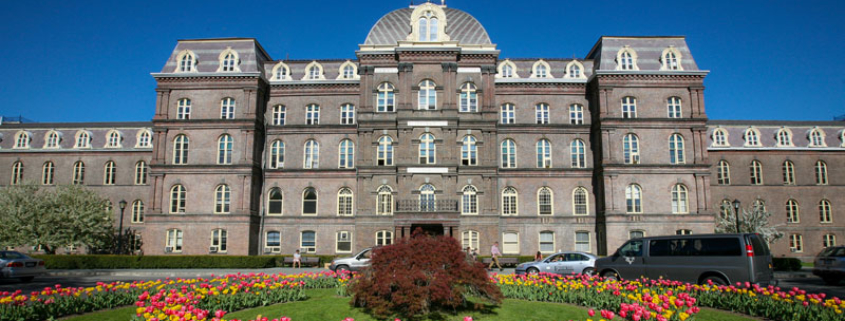When Greek Gods Fall
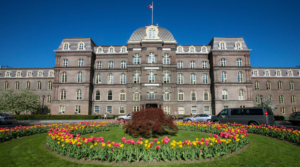
Main entrance (College Evaluator)
His name was Nicolas. We called him “Greek God.” It was 1995, pre-Facebook and we huddled in a dorm room, perusing a glossy, thin booklet displaying headshots of over 500 Vassar freshmen. Instead of chugging tepid beer at a nearby party, our friend group, a motley crew who shared little in common except that we were all beneficiaries of generous financial aid packages, ate greasy pizza and doled out nicknames for classmates we’d noticed from afar but hadn’t yet met. “Drama Girl” for a willow-thin young woman who wrapped Pucci silk scarves around her Manhattan prep-school crown of chestnut highlights. “Greenwich Boy” for a trust-fund kid with green hair who dressed like Billy Idol and wore a pierced safety pin through his chapped bottom lip. And finally, there was “Greek God,” a rumored Austrian count by way of Palm Beach, Florida and Findlay, Ohio. Nicknames were saved for other first-years we found exotic and intimidating. Rich kids more sophisticated than us and therefore, more beautiful and deserving of a spot on a campus where they vacuumed fallen leaves and dried twigs off the rolling lawns each morning.
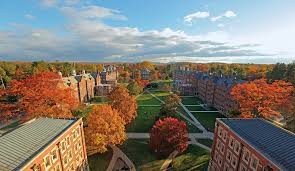
The quad in fall (Office of Residential Life)
Over the course of the semester, we eventually called them by their given names, yet for me, “Greek God” stuck. He looked the part with his gelled, flaxen curls, a pronounced, aquiline nose, and a smile both wide and broad that dominated his year-round sun-kissed face. Nicolas wasn’t much taller than me, maybe 5’10”, but his posture was like a dancer, and his broad shoulders and slim waist made him appear more formidable. And then there were his clothes: a seemingly never-ending array of Prada loafers, skin-tight Armani slacks, Versace jackets with swirls of turquoise and gold.
One particularly bleak February afternoon, I was walking back to my dorm from class and I spotted him across the empty quad. He pranced toward me along the slush-lined path wearing sumptuous black leather Chelsea boots and the most beautiful camel mohair coat I’d ever seen. A cashmere scarf trailed behind him like a Pride flag rippling in the icy wind. Nicolas must’ve noticed me staring, mouth agape, because he shot me a glance and then a wry, knowing smile that said, I dare you to look at me. I immediately shut my eyes and turned away, my nose in the air. He was fully out and I was only halfway there and resented his bravery. I was also jealous of all the things he had that I lacked: wealth, white privilege, ridiculously good looks, confidence. In any case, I decided that day to hate him and for the remainder of my college career, I went out of my way to ignore him whenever I saw him on the quad or at parties. At the time, I’d recently read Marx and Weber and saw myself as a budding Democratic Socialist, despite that I’d spent all of my summer barista tips on new clothes at J. Crew and Urban Outfitters. And because of this, I thought I was better than him. In my mind, Nicolas was part of the evil capitalist class with his silver BMW three-series and a wardrobe of showy designer clothes. Meanwhile, I strived to be an understated, yet stylish, social justice warrior who just happened to know the brand names of everything he wore and drove.
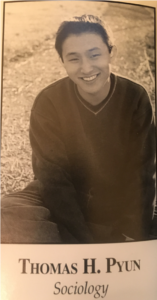
Senior yearbook photo (Vassarion 1999)
*
For the next two decades, we didn’t cross paths nor did he cross my mind much. Then a few months ago, I woke to find a former classmate had posted a news article about him on Facebook. The story said he’d worked as the personal assistant to the head of an investment bank and had stolen over a million dollars’ worth of wine from his employer. After hiding out in Brazil, Morocco, and Italy for fourteen months, he was arrested at the Los Angeles airport and transported to the LA County Jail, the latter of which just happened to be where I worked as the Senior Fellow, charged with improving healthcare delivery for inmates. In my pre-caffeinated morning haze, none of the story’s pieces made sense. Wasn’t he Austrian Royalty? If he was so rich, why was he working as a modern-day butler? I swiped through the article for photos of him but was disappointed to find none.
When I arrived at my office at the county jail’s healthcare division, I cancelled my morning staff meeting in order to Google news stories. Article after article portrayed him as a lifelong charlatan with humble midwestern roots. His mother wasn’t an Austrian countess but in fact, operated a self-storage facility. She’d mortgaged her house in Ohio to make his bail. Over the next few hours, I devoured everything I could find online until I realized he was probably in my building. I had to see him. To help him. I wanted to make sure he was housed in one of the LGBTQ wards so to avoid harassment or worse. I asked one of the sheriff’s deputies I’d befriended how to gain access to the jail information database and in my manic fuss, I spilled that I was looking for a college friend.
“Don’t do it,” she said. “That’s called fraternization. You could lose your job. It’s considered breaking the law.”
I returned to my desk crestfallen but decided my mission was worth the risk. I clicked open the database and was about to type his name into the search engine. It dawned on me that I didn’t know what to say to him besides asking whether he felt safe. I then looked down at my battered J. Crew khakis and denim shirt that had recently started buckling against my growing stomach. I was middle-aged, starting to look it, and working in a jail. And though it sounds ridiculous given that he was the one behind bars, I was too ashamed to face him. Besides, what if he didn’t remember who I was? It had been almost twenty years. So I closed the database and returned to work, rationalizing it wasn’t worth risking my livelihood for someone I’d barely known.
Weeks passed and I convinced myself that Nicolas would get off without jail time. Some politician would pardon him or the investment banker would drop charges or the judge would order community service in lieu of time served.

LA County Men’s Jail (AP Photo/Damian Dovarganes, File)
“We live in a country where white people, especially pretty ones, get away with just about everything,” I said to a friend with a dismissive eye-roll.
However, Nicolas made the mistake of doing the one thing you can never get away with in America and that’s steal from the wealthy. In 2008, American bankers bamboozled middle- and working-class folks into billions of dollars’ worth of subprime mortgages and were later gifted a bailout. Around the same time, Bernie Madoff, an investment advisor for the uber-wealthy was caught defrauding his clients and slapped with a maximum sentence of 150 years. One news story reported Nicolas’s mother begged his former employer’s wife to drop the charges. She even promised to repay them for the wine. Purportedly, the investment banker’s wife said it was out of her hands.
On the day of his arraignment, Nicolas checked into the Carlyle Hotel in Manhattan and jumped to his death. A news article reported that he’d called his sister before to say he couldn’t go back to jail. The following day, I called in sick to work. I wallowed in bed wondering if there was something I could’ve said or done to have changed the outcome. And though in retrospect, this rumination was ultimately self-serving, it was my way of mourning someone I didn’t know well but with whom I shared something in common. We were both class traitors. I am the only son of Korean immigrants and, like Nicolas, raised squarely middle-class. We’d clawed our way into an elite liberal arts college historically reputed for educating young women of the leisure class. We strived for lives that outsized our birthright.
*
This summer, I will fly to New York before riding a Metro-North train to Poughkeepsie for my 20th college reunion. I don’t consider myself a “rah-rah” reunion-type, and despite incessant pleas, my close friends have chosen not to attend. However, there will be a memorial service where we remember those from our class we’ve lost. I hope to light a candle for our Greek God.
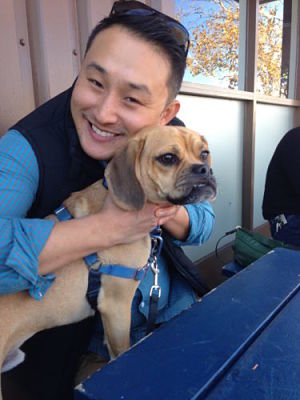
Tom Pyun is a writer based in Los Angeles. He was a fellow with Tin House, Vermont Studio Center, Gemini Ink, and VONA/Voices. His work has appeared in The Rumpus, 7×7.la, Joyland, and Blue Mesa Review and has been nominated for a Pushcart Prize and a Best of the Net award. He is an MFA candidate in fiction at Antioch University.

